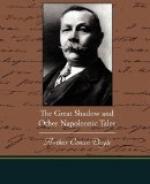Well, then, as I stumbled through the vineyard, something loomed in front of me, and I came upon a great square house with another long, low building upon one side of it. Three roads met there, and it was easy to see that this was the posada, or wine-shop. There was no light in the windows, and everything was dark and silent, but, of course, I knew that such comfortable quarters were certainly occupied, and probably by some one of importance. I have learned, however, that the nearer the danger may really be the safer the place, and so I was by no means inclined to trust myself away from this shelter. The low building was evidently the stable, and into this I crept, for the door was unlatched. The place was full of bullocks and sheep, gathered there, no doubt, to be out of the clutches of marauders. A ladder led to a loft, and up this I climbed, and concealed myself very snugly among some bales of hay upon the top. This loft had a small open window, and I was able to look down upon the front of the inn and also upon the road. There I crouched and waited to see what would happen.
It was soon evident that I had not been mistaken when I had thought that this might be the quarters of some person of importance. Shortly after daybreak an English light dragoon arrived with a despatch, and from then onwards the place was in a turmoil, officers continually riding up and away. Always the same name was upon their lips: “Sir Stapleton—Sir Stapleton.” It was hard for me to lie there with a dry moustache and watch the great flagons which were brought out by the landlord to these English officers. But it amused me to look at their fresh-coloured, clean-shaven, careless faces, and to wonder what they would think if they knew that so celebrated a person was lying so near to them. And then, as I lay and watched, I saw a sight which filled me with surprise.
It is incredible the insolence of these English! What do you suppose Milord Wellington had done when he found that Massena had blockaded him and that he could not move his army? I might give you many guesses. You might say that he had raged, that he had despaired, that he had brought his troops together and spoken to them about glory and the fatherland before leading them to one last battle. No, Milord did none of these things. But he sent a fleet ship to England to bring him a number of fox-dogs, and he with his officers settled himself down to chase the fox. It is true what I tell you. Behind the lines of Torres Vedras these mad Englishmen made the fox-chase three days in the week. We had heard of it in the camp, and now I was myself to see that it was true.




